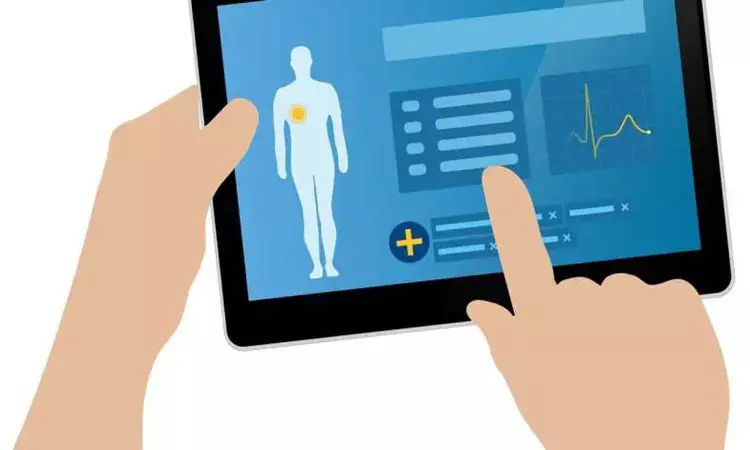- Home
- Medical news & Guidelines
- Anesthesiology
- Cardiology and CTVS
- Critical Care
- Dentistry
- Dermatology
- Diabetes and Endocrinology
- ENT
- Gastroenterology
- Medicine
- Nephrology
- Neurology
- Obstretics-Gynaecology
- Oncology
- Ophthalmology
- Orthopaedics
- Pediatrics-Neonatology
- Psychiatry
- Pulmonology
- Radiology
- Surgery
- Urology
- Laboratory Medicine
- Diet
- Nursing
- Paramedical
- Physiotherapy
- Health news
- Fact Check
- Bone Health Fact Check
- Brain Health Fact Check
- Cancer Related Fact Check
- Child Care Fact Check
- Dental and oral health fact check
- Diabetes and metabolic health fact check
- Diet and Nutrition Fact Check
- Eye and ENT Care Fact Check
- Fitness fact check
- Gut health fact check
- Heart health fact check
- Kidney health fact check
- Medical education fact check
- Men's health fact check
- Respiratory fact check
- Skin and hair care fact check
- Vaccine and Immunization fact check
- Women's health fact check
- AYUSH
- State News
- Andaman and Nicobar Islands
- Andhra Pradesh
- Arunachal Pradesh
- Assam
- Bihar
- Chandigarh
- Chattisgarh
- Dadra and Nagar Haveli
- Daman and Diu
- Delhi
- Goa
- Gujarat
- Haryana
- Himachal Pradesh
- Jammu & Kashmir
- Jharkhand
- Karnataka
- Kerala
- Ladakh
- Lakshadweep
- Madhya Pradesh
- Maharashtra
- Manipur
- Meghalaya
- Mizoram
- Nagaland
- Odisha
- Puducherry
- Punjab
- Rajasthan
- Sikkim
- Tamil Nadu
- Telangana
- Tripura
- Uttar Pradesh
- Uttrakhand
- West Bengal
- Medical Education
- Industry
TAVR better than SAVR after mediastinal radiation for valve replacement: JACC

USA: TAVR has benefits over SAVR in patients who require valve replacement after undergoing mediastinal radiation, suggests a recent study in the journal JACC: Cardiovascular Interventions.
Mediastinal radiation is used for the treatment of different types of malignancies involving the lungs, chest, breast, lymph nodes and mediastinum. However, the therapy might lead to the development of radiation-associated cardiopulmonary disease, aortic stenosis being most common. Exposure to prior radiation in patients with severe aortic stenosis increases risk of long-term mortality following surgical replacement. Transcatheter aortic valve replacement (TAVR) is a reasonable therapeutic strategy for patients with severe aortic stenosis irrespective of their surgical risk. Percutaneous approach makes a better alternative for the treatment of patients with prior mediastinal radiation undergoing surgical replacement having .high peri-operative mortality and morbidity
There is a lack of data comparing outcomes of SAVR versus TAVR in patients with prior mediastinal radiation. To address this knowledge gap, Hani Jneid, Baylor School of Medicine, Houston, Texas, and colleagues evaluated the trends and outcomes of patients with prior mediastinal radiation receiving AVR using a large national administrative claims database.
For the purpose, the researchers queried the National Inpatient Sample database years 2012 to 2017 for hospitalization of patients with prior mediasinal radiation who underwent isolated AVER. The study compared the outcomes of TAVR versus SAVR using multivariable analysis. The main study outcome was in-hospital mortality.
The final analysis included 3,675 hospitalizations for isolated AVR; of whom 59.1% underwent TAVR and 40.9% underwent isolated SAVR.
Key findings of the study include:
- TAVR was increasingly performed over time, but there was no significant increase in the rates of utilization of SAVR.
- The following factors were independently associated with TAVR utilization: older age, chronic lung disease, coronary artery disease, chronic kidney disease, prior cerebrovascular accidents, prior coronary artery bypass grafting, and larger-sized hospitals, while women were less likely to undergo TAVR.
- Compared with SAVR, TAVR was associated with lower in-hospital mortality (1.2% vs. 2.0%, adjusted odds ratio: 0.27).
- TAVR was associated with lower rates of acute kidney injury, use of mechanical circulatory support, bleeding and respiratory complications, and shorter length of hospital stay.
- TAVR was associated with higher rates of pacemaker insertion.
To summarize -- Compared with SAVR, TAVR was associated with lower in-hospital mortality, lower bleeding and respiratory complications, and shorter length of stay but was associated with higher rates of permanent pacemaker insertion.
"This nationwide observational analysis showed that TAVR is increasingly performed among patients with prior mediastinal radiation," wrote the authors.
"In light of the available data, TAVR can provide a safe alternative treatment option for AVR among patients with prior mediastinal radiation. Further studies exploring the long-term comparative safety and effectiveness of TAVR and SAVR among patients with prior mediastinal radiation are warranted," they concluded.
The study, "Transcatheter Versus Surgical Aortic Valve Replacement in Patients With Prior Mediastinal Radiation," is published in the journal JACC: Cardiovascular Interventions.
Dr Kamal Kant Kohli-MBBS, DTCD- a chest specialist with more than 30 years of practice and a flair for writing clinical articles, Dr Kamal Kant Kohli joined Medical Dialogues as a Chief Editor of Medical News. Besides writing articles, as an editor, he proofreads and verifies all the medical content published on Medical Dialogues including those coming from journals, studies,medical conferences,guidelines etc. Email: drkohli@medicaldialogues.in. Contact no. 011-43720751


